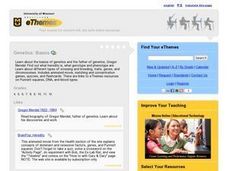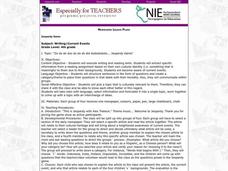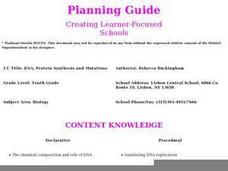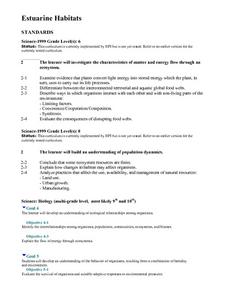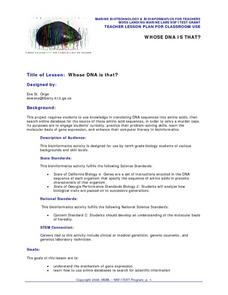Curated OER
Nature and Nurture
Students look into the role both nature and nurture play in determining an individual's traits. They examine how genes and the environment affect personality
Curated OER
Nature And Nurture
Learners develop an understanding of the role both nature and nurture play in determining an individual's traits. Using a website, students answer questions about nature and nurture in order to solve the riddle, What do you call a smart...
Curated OER
Disproving the Proof
Students investigate the progression of discoveries that have led to the genetics knowledge that scientists currently have. They determine how genetic experiments disproved previous theories on inheritance.
Curated OER
WHAT IS A CELL?
Students explore the function and structures of cells, including plant and animal cells. They explore cell parts including cell wall, ribosomes, chromosomes, nucleoid, plasmids, flagella, pilli, and plasma membrane, cel
Curated OER
Genetics: Basics
Students study the basics of genetics and the father of genetics Gregor Mendel.
Curated OER
What Can We Learn From the X Chromosome?
Students read about the X and Y chromosomes in humans and complete a worksheet.
Curated OER
Jeopardy Game
Fourth graders, in groups, play Jeopardy using newspaper, scissors, paper, pen, and large chalkboard with chalk.
Curated OER
Blood Business
Students identify the different kinds of blood. In this biology lesson, students investigate the antigens, agglutinins and Rh factor using their own blood. They use Punnett squares to predict blood type of offspring.
Curated OER
DESIGNER GENES: ONE SIE FITS ALL?
Students explore genetic engineering and issues related to risks and benefits of altering agricultural products.
Curated OER
Science: Designer genes
Students engineer new organisms using biotechnology. In small groups, they write procedures, list benefits and drawbacks, and explain how their new organism might affect the environment. After creating their new organisms, they present...
Curated OER
"Chips" Off the Old Block?
Students study using analogies between common items or occurrences and science concepts. They use the analogy of cookie recipes to that of the DNA "recipes" for living things to help us explain more about mutations.
Curated OER
What Increases the Risk of Cardiovascular Disease?
Young scholars analyze the risk factors for cardiovascular disease and classify them according to whether or not they are controllable. They discover how to reduce the probability of high blood pressure through diet and exercise.
Curated OER
"Home Sweet Home?"
Students research an endangered animal's habitat, investigate the survival problems. They research the animal's zoo life. They research some programs of reintroduction and chart the pros and cons of each.
Curated OER
Comparing Apples and Oranges
Fifth graders, in groups, examine different types of apples and how they are different. They also taste the differences of each apple. They use this lesson to explore how to make observations.
Curated OER
DNA, Protein Synthesis and Mutations
Tenth graders investigate the chemical composition of DNA and RNA and how they work together to synthesize protein. They discover genetic codes, gene chromosome theory, and how the environment influences our appearance.
Curated OER
From Genomes of Species
Pupils investigate genomic research being done and its potential for understanding, treating, and possibly curing human genetic conditions. The potential of proteomic research as a companion to the work being done with genomics is...
Curated OER
Lippmann vs. The Testers: Can Intelligence Be Measured?
Students examine the ideas of Walter Lippman and standardized testing. They discover the ideas and beliefs behind using standarized tests. They examine a copy of an IQ test and discuss.
Curated OER
Estuarine Habitats
Sixth graders study the important habitats, flora, fauna, and physical factors of coastal habitats. They compare the aquatic habitats to terrestrial habitats by researching and completing tables with the information.
Curated OER
Cell Structure and DNA
Sixth graders identify, locate and describe the function of the parts of a cell. In groups, they state the five stages of mitosis and put them in the correct order. They are introduced to the structure of DNA and mRNA and how they...
Curated OER
Investigating Animals in Water
Students observe small animal activity. They identify local water animals and describe the habitats where water animals can be found. Students collect samples to observe in the classroom.
Curated OER
Evolution, Genes, and Behavior
Students examine the roles of genes and evolution on behaviors. In groups, they identify the relationships among DNA, genes and chromosomes. They evaluate the different theories of language acquistion and how evolved tendencies interact...
Curated OER
Genetic Disorders
Seventh graders discuss traits, traits that are inherited and how genes and chromosomes carry the code for traits. They research genetic disorders and their link to chromosome abnormalites and write a report on their findings. which...
Curated OER
DNA-a Molecular Identity
Students explore about what DNA is and several different DNA typing techniques. They examine three different situations where DNA typing was used to carry out justice. Students also identify and evaluate different uses of DNA typing...
Curated OER
Whose DNA Is That?
Pupils investigate the use of technology in order to identify different sequences of amino acids by using online web tools. They enhance problem solving skills with amino acid identification skills and strengthening comfort with using...
Other popular searches
- Genetics and Heredity
- Punnett Squares Heredity
- Genes and Heredity
- Heredity and Reproduction
- Heredity Unit
- Lesson Plans on Heredity
- Case Study Heredity
- Dna and Heredity
- Genetics Heredity
- Psychology Heredity
- Mendel Heredity
- Genetics and Heredity Labs






